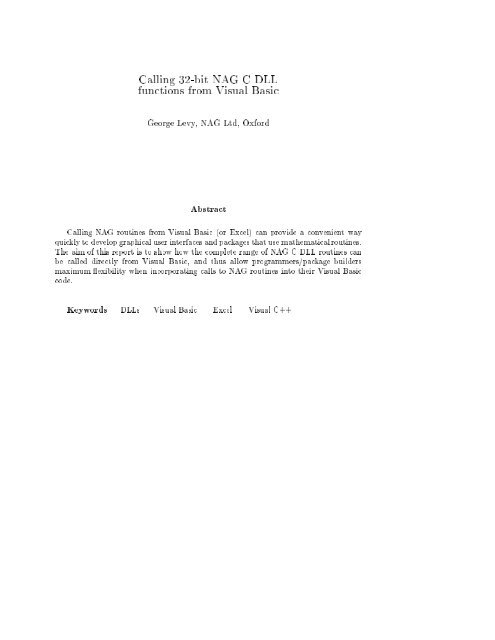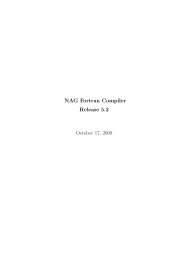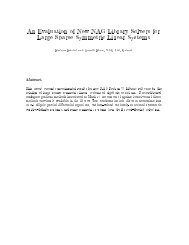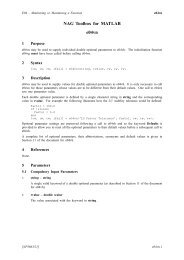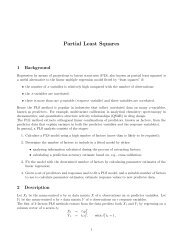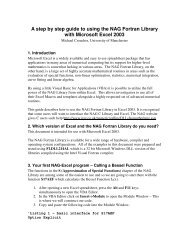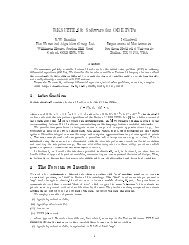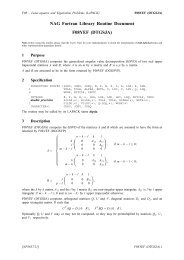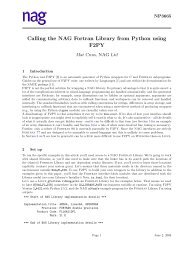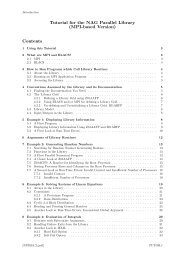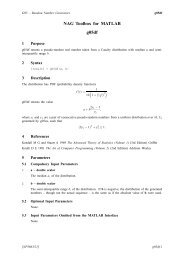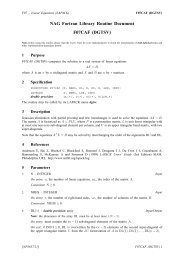Calling 32-bit NAG C DLL functions from Visual Basic
Calling 32-bit NAG C DLL functions from Visual Basic
Calling 32-bit NAG C DLL functions from Visual Basic
You also want an ePaper? Increase the reach of your titles
YUMPU automatically turns print PDFs into web optimized ePapers that Google loves.
<strong>Calling</strong> <strong>32</strong>-<strong>bit</strong> <strong>NAG</strong> C<strong>DLL</strong><strong>functions</strong> <strong>from</strong> <strong>Visual</strong> <strong>Basic</strong>George Levy, <strong>NAG</strong> Ltd, OxfordAbstract<strong>Calling</strong> <strong>NAG</strong> routines <strong>from</strong> <strong>Visual</strong> <strong>Basic</strong> (or Excel) can provide a convenient wayquickly to develop graphical user interfaces and packages that use mathematical routines.The aim of this report is to show how the complete range of <strong>NAG</strong> C <strong>DLL</strong> routines canbe called directly <strong>from</strong> <strong>Visual</strong> <strong>Basic</strong>, and thus allow programmers/package buildersmaximum exibility when incorporating calls to <strong>NAG</strong> routines into their <strong>Visual</strong> <strong>Basic</strong>code.Keywords <strong>DLL</strong>s <strong>Visual</strong> <strong>Basic</strong> Excel <strong>Visual</strong> C++
21IntroductionThe PC Windows environment is constructed so that all applications make calls to DynamicLink Libraries (<strong>DLL</strong>s). These <strong>DLL</strong>s may contain system library routines provided by aparticular computer vendor (e.g., the <strong>DLL</strong>s for Windows 95 supplied by Microsoft) or maybe customized third party <strong>DLL</strong>s which provide a set of specialised <strong>functions</strong> (e.g., graphical,mathematical, text processing etc).<strong>NAG</strong> has developed <strong>32</strong>-<strong>bit</strong> mathematical <strong>DLL</strong>s containing the routines in its Fortran 77and C numerical libraries [1], [2]. It is envisaged that these routines will be mainly used bymathematical/scientic programmers who use <strong>Visual</strong> C++, Fortran PowerStation or <strong>Visual</strong><strong>Basic</strong> to build their applications.In particular, calling <strong>NAG</strong> routines <strong>from</strong> <strong>Visual</strong> <strong>Basic</strong> (or Excel [3]) can provide a convenientway quickly to develop graphical user interfaces and packages that use mathematicalroutines. These interfaces, which may use dialog boxes, menus etc, are simple to use anddo not require the end-user to have anyknowledge of the underlying <strong>DLL</strong> routine, or evencomputer languages such asFortran 77, C and <strong>Visual</strong> <strong>Basic</strong> [4], [5].This report is intended for <strong>Visual</strong> <strong>Basic</strong> programmers/package builders, and is concernedwith the issues involved in calling the <strong>NAG</strong> C <strong>DLL</strong> routines <strong>from</strong> <strong>Visual</strong> <strong>Basic</strong>.The main problems associated with using the <strong>DLL</strong> routines are Data type matching Function declarations Null pointers Function arguments Two-dimensional array arguments Allocation of storage Software limitationsOne method of dealing with these issues is to do most of the programming in C and use anauxiliary <strong>DLL</strong> to pass the results back to <strong>Visual</strong> <strong>Basic</strong>. This has the disadvantage that, sincethe <strong>NAG</strong> C <strong>DLL</strong> routines cannot be accessed directly <strong>from</strong> <strong>Visual</strong> <strong>Basic</strong>, minor variationsto routine arguments may require the auxiliary <strong>DLL</strong> to be completely rebuilt.Here we use an alternative approach and illustrate how the full range of C Library routinescan be called directly <strong>from</strong> <strong>Visual</strong> <strong>Basic</strong>, and thus give programmers maximum exibilitywhen using the <strong>NAG</strong> C<strong>DLL</strong>.A rudimentary understanding of pointers is required and, in certain circumstances, an auxiliary<strong>DLL</strong> needs to be built (template C code is provided for this).
3Appendix C contains <strong>Visual</strong> <strong>Basic</strong> example code fragments which have been tested (<strong>from</strong>Windows 95) using both Excel 7.0 and <strong>Visual</strong> <strong>Basic</strong> 4.0.2 Data type matchingThis section considers the <strong>Visual</strong> <strong>Basic</strong> data types required to match those which occur inthe routine argument lists of a (<strong>32</strong>-<strong>bit</strong>) <strong>NAG</strong> C <strong>DLL</strong>. (More detail concerning data typescan be found in the <strong>NAG</strong> C Library manuals [1].)Fundamental typesA brief summary of the fundamental types is:Ctypes Size in bytes <strong>Visual</strong> <strong>Basic</strong> typeschar 1 String * 1Integer 4 LongBoolean 4 Longint 4 Longdouble 8 DoubleIn addition the <strong>NAG</strong> denedtype Complex is:typedef struct fdouble re,img ComplexBoolean & enumeration typesIn <strong>Visual</strong> <strong>Basic</strong> all Boolean or enumeration variables should be declared as type Long. Forexample the C code:typedef enum {Nag_MeanInclude, Nag_MeanZero} Nag_IncludeMeantypedef enum {Nag_RK_2_3=1, Nag_RK_4_5, Nag_RK_7_8} Nag_RKNag_IncludeMean meanNag_RK rkBoolean printit, stopitmean = Nag_MeanZeromean = Nag_MeanIncludeprintit = TRUEstopit = FALSErk = Nag_RK_7_8rk = Nag_RK_2_3can be written in <strong>Visual</strong> <strong>Basic</strong> as:Dim mean As LongDim rk As LongDim printit As LongDim stopit As Longmean = 1mean = 0printit = 1
4stopit = 0rk = 3rk = 1where FALSE = 0 and TRUE = 1. The above example illustrates that, by default, enumeratorsin a givenCenumeration type declaration start at zero and increase by 1 as thedeclaration is read <strong>from</strong> left to right. However, if a given enumerator is assigned a valuethen subsequent enumerators continue the progression <strong>from</strong> the assigned value.StructuresMany of the <strong>DLL</strong> routines use structures in their argument lists. Sometimes, for examplein the d02 and e04 chapters, these structures are rather complicated and may contain otherstructures. When the structure is relatively simple it is often convenient to dene a <strong>Visual</strong><strong>Basic</strong> user-dened type and then make a direct call to the <strong>DLL</strong> routine. Complicatedstructures are most easily dealt with by the use of an auxiliary <strong>DLL</strong> (this is illustrated inthe Optimize example in Appendix C).A structure that is required by nearly all of the routines is the type NagError. This isdened as:typedef struct fint codeBoolean printchar message[512]void (*handler)(char*, int*,char*)Integer errnumg NagErrorThe corresponding <strong>Visual</strong> <strong>Basic</strong> user-dened type is:Type NagErrorTypecode As Longprintm As LongMessage(511) As String * 1handler As Longerrnum As LongEnd Typewhere both int, Integer and Boolean types have been replaced by Long and the pointerto the handler function has been replaced by a structure memberoftype Long.As another example the type Nag Spline (used by routines e02bac and e02bbc) is denedas:typedef struct fInteger ndouble *lamdadouble *cInteger init1Integer init2g Nag Spline
5The corresponding <strong>Visual</strong> <strong>Basic</strong> user-dened type is:Type NagSplinenAsLonglamda As LongcAsLonginit1 As Longinit2 As LongEnd Typewhere both pointers to type double have been replaced by integersoftype Long.3Function declarationsThe C <strong>DLL</strong> routines are called by using the following syntax:Declare Function name Lib `library name' Alias `decorated name' (arguments) As return typeorDeclare Sub name Lib `library name' Alias `decorated name' (arguments)The routine arguments can be obtained <strong>from</strong> the appropriate <strong>NAG</strong> header le and the`decorated name' is generated <strong>from</strong> the <strong>DLL</strong> routine name using the following convention:An underscore ( ) is prexed to the routine name. The name is followed by the at-sign(@) character, followed by the numberofbytes in the argument list. Appendix A lists thedecorated names for the <strong>functions</strong> exported <strong>from</strong> the <strong>NAG</strong> C <strong>DLL</strong>.For instance the ANSI C declarations for routines s17agc and g01aac are:double s17agc(double x, NagError *fail)void g01aac(Integer n, double x[], double wt[], Integer *nvalid,double *xmean, double *xsd, double *xskew, double *xkurt,double *xmin, double *xmax, double *wsum, NagError *fail)and they would be declared in <strong>Visual</strong> <strong>Basic</strong> as:Declare Function s17agc Lib "nagcl04_noopt" Alias "_s17agc@12" (ByVal x As Double, _ifail As NagErrorType) As DoubleandDeclare Sub g01aac Lib "nagcl04_noopt.dll" Alias "_g01aac@48" (ByVal n As Long, _x As Double, wt As double, nvalid As Long, xmean As Double, xsd As Double, _xskew As Double, xkurt As Double, xmin As Double, xmax As Double, wsum As Double, _ifail As NagErrorType)In C, pointers are used to pass arguments by reference (e.g., double *xsd, Integer *nvalid,double x[], etc) here the notation [] is used to denote an array argument. When argumentsare passed by value in C the syntax type variable name (e.g., Integer n, double x, etc) isused.In <strong>Visual</strong> <strong>Basic</strong>, by default, all arguments are passed by reference the keyword ByVal isrequired to pass an argument byvalue.
64 Null pointersMany of the <strong>NAG</strong> C Library routines make use of null pointers to indicate that an argumentis to be ignored and default action is to be taken.For example C routine g01aac has a pointer argument wt whichallows the routine to performstatistical computations involving weighted data. If this argument is set to the null pointerthen unweighted calculations are performed all the weights are assumed to be 1. In <strong>Visual</strong><strong>Basic</strong> this can be accomplished by declaring g01aac as follows:Declare Sub g01aac Lib "nagcl04_noopt.dll" Alias "_g01aac@48" (ByVal n As Long, _x As Double, ByVal wt As Long, nvalid As Long, xmean As Double, xsd As Double, _xskew As Double, xkurt As Double, xmin As Double, xmax As Double, _wsum As Double, ifail As NagErrorType)where the declaration wt As Long (instead of wt As double) has been used to allow thisargument to be used as a pointer. The routine callsCall g01aac(n, x(0), ByVal 0&, nvalid, xmean, xsd, xskew, xkurt, xmin, xmax, wsum, pfail)Call g01aac(n, x(0), 0, nvalid, xmean, xsd, xskew, xkurt, xmin, xmax, wsum, pfail)are both valid and result in unweighted calculations being performed.The use of null pointers to indicate default behaviour can also be accomplished when theroutines have function arguments. For example routine d02ejc has the function argumentsfcn, pederv, g and output, and an ANSI C function declaration:d02ejc (Integer neq, <strong>NAG</strong>_D02EJC_FUN fcn, <strong>NAG</strong>_D02EJC_PFUN pederv, double *t, double y[],double tend, double tol, Nag_ErrorControl err_c, <strong>NAG</strong>_D02EJC_OUTFUN output,<strong>NAG</strong>_D02EJC_GFUN g, Nag_User *comm, NagError *fail)If it is declared in <strong>Visual</strong> <strong>Basic</strong> as:Declare Sub d02ejc Lib "nagcl04_noopt.dll" Alias "_d02ejc@56" (ByVal neq As Long, _ByVal ptr_fcn As Long, ByVal ptr_pederv As Long, x As Double, y As Double, _ByVal xend As Double, ByVal tol As Double, ByVal err_c As Long, _ByVal ptr_output As Long, ByVal ptr_g As Long, comm As Nag_User, _ifail As NagErrorType)then the callsptr = d02ejc fcnCall d02ejc(neq, ptr, ByVal 0&, x, y(0), xend, tol, err c, ByVal 0&,ByVal 0&, comm, pfail)Call d02ejc(neq, ptr, 0, x, y(0), xend, tol, err c, 0, 0, comm, pfail)both result in the internal evaluation of the Jacobian pederv. The next section gives moredetail concerning function arguments the ODE example section illustrates the use of theroutine d02ejc.
75Function argumentsIn contrast to C, <strong>Visual</strong> <strong>Basic</strong> procedures are not allowed to have function arguments. Thislimitation creates a problem when using and declaring <strong>DLL</strong> routines that require functionarguments (these routines are mainly in the d and e chapters of the <strong>NAG</strong> C Library). Asolution to this problem is to create an auxiliary <strong>DLL</strong> which both denes the requiredfunction arguments and also exports pointers to them. These function pointers can thenbe used in the routine argument lists of <strong>DLL</strong> procedures called <strong>from</strong> <strong>Visual</strong> <strong>Basic</strong>. The<strong>Visual</strong> <strong>Basic</strong> code fragments and auxiliary <strong>DLL</strong> template C code for the ODE, Optimizeand Integrate examples given in Appendix C illustrate this.6Two-dimensional array argumentsIn <strong>Visual</strong> <strong>Basic</strong> multi-dimensional arrays are stored by columns (as in Fortran) rather thanby rows, which istheCconvention. This means that care must be taken when a <strong>DLL</strong>routine has matrix (two-dimensional array) arguments.For example, assume that a 3-by-2 matrixA =0B@11 1221 2231 <strong>32</strong>1CAis stored in a <strong>Visual</strong> <strong>Basic</strong> 2-dimensional array a in the natural manner, as in the followingcode fragment:Dim a(2,1) As Doublea(0,0) = 11a(1,0) = 21a(2,0) = 31a(0,1) = 12a(1,1) = 22a(2,1) = <strong>32</strong>The array a consists of 6 elements stored in column order, as follows:11 21 31 12 22 <strong>32</strong>However, routines in the <strong>NAG</strong> C <strong>DLL</strong> follow the standard C convention that 2-dimensionalarrays are stored in row order. Suppose the array a were passed to a <strong>NAG</strong> C routine (f02wec,say, as in the SVD example in Appendix C):Call f02wec(3,2,a(0,0), ... )
8where the rst two arguments specify the numbers of rows and columns in the matrix. Theroutine would treat the array as representing a 3-by-2 matrix stored in row order:0B@11 2131 1222 <strong>32</strong>1CAwhich isnot the intended matrix A.One solution (which is used in Appendix C) is to store the matrix in a 1-dimensional arraya1, with the element a ij stored in a1((i-1)*tda+j-1), where tda is the trailing dimensionof the matrix (in this case 2).Dim a1(5) As DoubleDim tda As Longtda = 2a1(0) = 11a1(1) = 12a1(2) = 21a1(3) = 22a1(4) = 31a1(5) = <strong>32</strong>Call f02wec(3,2,a1(0),tda ... )Another solution is to store the transpose of the matrix A in a 2-dimensional array at, withtda now being the leading dimension of the array at:Dim at(1,2) As DoubleDim tda As Longtda = 2at(0,0) = 11at(0,1) = 21at(0,2) = 31at(1,0) = 12at(1,1) = 22at(1,2) = <strong>32</strong>Call f02wec(3,2,at(0,0),tda, ... )The <strong>Visual</strong> <strong>Basic</strong> array at can be larger than is needed to store the 2-by-3 matrix A T inorder that the C routine accesses the correct array elements it is essential that tda is set tothe correct value:
9Dim at(3,5) As DoubleDim tda As Longtda = 4. . .Call f02wec(3,2,at(0,0),tda, ... )7 Allocation of storageThe <strong>DLL</strong> utility routines x04bec and x04bfc have been provided to facilitate pointer manipulation<strong>from</strong> within <strong>Visual</strong> <strong>Basic</strong> their <strong>Visual</strong> <strong>Basic</strong> declarations are:Declare Sub set pointer Lib "nagcl04 noopt.dll" Alias" x04bec@12" (ptr As Long, ar As Double, n As Long)Declare Sub get pointer Lib "nagcl04 noopt.dll" Alias" x04bfc@12" (ptr As Long, ar As Double, n As Long)The routine set pointer allocates 8n bytes of internal storage to the pointer ptr and copiesn elements (of type double) <strong>from</strong> the <strong>Visual</strong> <strong>Basic</strong> array ar.The routine get pointer copies n elements <strong>from</strong> the internal memory associated withpointer ptr, to the <strong>Visual</strong> <strong>Basic</strong> array ar (of type double).A further utility routine x04bdc is used to free the memory allocated by x04bec itcanbedeclared as:Declare Sub free Lib "nagcl04 noopt" Alias " x04bdc@4" (ptr As Long)The use of set pointer can be illustrated by slightly modifying the example given in thesection on null pointers. In the following code extract the rst call to g01aac uses theweights supplied in the array wt, while the second results in unweighted computations.set pointer(ptr,wt(0),n)Call g01aac(n, x(0), ptr, nvalid, xmean, xsd, xskew, xkurt, xmin, xmax, wsum, pfail)ptr = 0Call g01aac(n, x(0), ptr, nvalid, xmean, xsd, xskew, xkurt, xmin, xmax, wsum, pfail)The Spline example, in Appendix C, illustrates the use of both get pointer and set pointerfor variable assignment and retrieval within a structure of type Nag Spline.8 Software limitationsIt is recommended that that the unoptimised <strong>NAG</strong> C <strong>DLL</strong>, `nagcl04 noopt', be used withinExcel/<strong>Visual</strong> <strong>Basic</strong> tests have shown that errors occur when some <strong>functions</strong> within theoptimised <strong>DLL</strong>, `nagcl04', are called <strong>from</strong> <strong>Visual</strong> <strong>Basic</strong>.Functions in Chapter a02 which pass the structure Complex by value cannot be called
10<strong>from</strong> <strong>Visual</strong> <strong>Basic</strong>. This is because user-dened types may not be passed <strong>from</strong> <strong>Visual</strong> <strong>Basic</strong>to a C <strong>DLL</strong> by value.In Excel, function names of the form c0[1-9][a-z][a-z][a-z] (e.g., c02afc) are not permittedthis means that care must be exercised when using the <strong>Visual</strong> <strong>Basic</strong> alias facility on routinesin Chapters c02, c05 and c06.9 Discussion of examplesThis section provides brief comments on the example code fragments of Appendix C. Allthe examples use the unoptimized <strong>NAG</strong> C <strong>DLL</strong>, `nagcl04 noopt', and some make use of anauxiliary <strong>DLL</strong> called `examples interfaces'.The example code has been written so that it can be used <strong>from</strong> either Excel 7.0 or <strong>Visual</strong><strong>Basic</strong> 4.0. It has been successfully tested with both these packages under Windows 95.Spline exampleThis example illustrates the use of the (previously dened) type Nag Spline which ispassed to the <strong>DLL</strong> routines e02bac and e02bbc. This structure contains two pointers oftype double, c and lamda. The memory associated with pointer lamda must be allocatedbefore e02bac is called while the memory associated with c is allocated internally by theroutine.SVD exampleIn this example the <strong>DLL</strong> routine is given two <strong>Visual</strong> <strong>Basic</strong> declarations. The function f02wecis used to calculate both the singular values and also the left and right singular vectors of amatrix A it also requires the declaration of `dummy' arrays for certain array arguments thatare not referenced. The function f02wec ptr is used to calculate the singular values only,and contains the declarations ByVal q As Long, ByVal b As Long and ByVal pt As Longwithin its argument list. This enables assignment ofnull pointers to these arguments andthus avoids the use of `dummy' array arguments when the routine is called. The example alsoillustrates how data is assigned to the input array a note that tda is the second (trailing)dimension of matrix A.ODE exampleIn the example d02ejc rst computes a solution with a user-dened Jacobian and thensolves the same problem using internal evaluation of the Jacobian. Use is made of pointerarguments to access <strong>functions</strong> which have return type void.Optimize exampleThis example requires a variable of type Nag E04 Opt to be initialised and passed toroutine e04ucc. The type Nag E04 Opt is too complicated to be dened within <strong>Visual</strong><strong>Basic</strong> and so an auxiliary <strong>DLL</strong> is used. In this approach avariable of type Nag E04 Opt isdeclared within the auxiliary <strong>DLL</strong> and a function, called e04 options ptr, is used to exporta pointer to the variable. Structure initialization and option setting can then be performed
11using routines e04xxc and e04xyc before e04 options ptr is supplied as an argument tothe optimizer routine e04ucc.Integrate exampleThe example illustrates how several integrals can be evaluated through the use of dierentfunction pointers which are exported <strong>from</strong> an auxiliary <strong>DLL</strong>. In this case the pointers areused to access <strong>functions</strong> which have return type double.AcknowledgementsThe author acknowledges the work of A Butterworth and S Datardina he would also liketo thank J Du Croz and D Sayers for their comments.References[1] The <strong>NAG</strong> CLibrary Manual, Mark 4, <strong>NAG</strong> Ltd, Oxford, UK, 1996.[2] The <strong>NAG</strong> Fortran Library Manual, Mark 17, <strong>NAG</strong> Ltd, Oxford, UK, 1996.[3] Microsoft Oce for Windows 95, Microsoft, 1995.[4] B W Kernighan and D M Ritchie The C Programming Language, Prentice Hall SoftwareSeries, 1988.[5] <strong>Visual</strong> <strong>Basic</strong> 4, Microsoft, 1996.
12Appendix A - Decorated function namesThe following is a list of the decorated function names exported by the <strong>NAG</strong> C <strong>DLL</strong>s.a00aac@0 a00abc@4 a02bac@16 a02bbc@16 a02bcc@16 a02cac@<strong>32</strong> a02cbc@<strong>32</strong>a02ccc@<strong>32</strong> a02cdc@<strong>32</strong> a02cec@16 a02cfc@16 a02cgc@<strong>32</strong> a02chc@<strong>32</strong> a02dac@16a02dbc@16 a02dcc@16 a02ddc@20 a02dec@24 a02dfc@<strong>32</strong> a02dgc@16 a02dhc@16a02djc@16 a02dkc@16 a02dlc@16 a02eic@<strong>32</strong> a02ejc@24c02afc@20 c02agc@20 c05adc@44 c05nbc@28 c05pbc@36 c05zbc@28 c06eac@12c06ebc@12 c06ecc@16 c06ekc@20 c06fpc@20 c06fpz@12 c06fqc@20 c06frc@24c06fuc@28 c06gbc@12 c06gcc@12 c06gqc@16 c06gsc@24 c06gzc@12 c06hac@20c06hbc@20 c06hcc@24 c06hdc@24d01ajc@56 d01akc@56 d01alc@64 d01amc@52 d01anc@68 d01apc@76 d01aqc@64d01asc@56 d01bac@<strong>32</strong> d01bbc@40 d01fcc@44 d01gac@24 d01gbc@56 d02cjc@52d02ejc@56 d02gac@64 d02gbc@72 d02nmc@104 d02nsc@24 d02nvc@76 d02pcc@44d02pdc@<strong>32</strong> d02ppc@4 d02pvc@64 d02pwc@16 d02pxc@44 d02pyc@24 d02pzc@24d02qfc@40 d02qwc@68 d02qyc@4 d02qzc@<strong>32</strong> d02rac@80 d02xkc@72 d02zac@20e01bac@20 e01bec@20 e01bfc@<strong>32</strong> e01bgc@36 e01bhc@40 e01dac@28 e01sac@<strong>32</strong>e01sbc@24 e01szc@4 e02bac@28 e02bbc@20 e02bcc@24 e02bdc@12 e02bec@48e02dcc@56 e02ddc@60 e02dec@24 e02dfc@28 e04ccc@28 e04dgc@<strong>32</strong> e04fcc@44e04gbc@44 e04hcc@28 e04jbc@44 e04kbc@44 e04mfc@48 e04nfc@60 e04ucc@60e04xxc@4 e04xyc@24 e04xzc@12 e04yac@36 e04ycc@<strong>32</strong>f01bnc@20 f01mcc@28 f01qcc@24 f01qdc@44 f01qec@<strong>32</strong> f01rcc@24 f01rdc@44f01rec@<strong>32</strong> f02aac@20 f02abc@28 f02adc@28 f02aec@36 f02afc@24 f02agc@<strong>32</strong>f02awc@20 f02axc@28 f02bjc@56 f02wec@72 f02xec@72 f03abc@24 f03aec@28f03afc@28 f03ahc@28 f04adc@36 f04agc@40 f04ajc@<strong>32</strong> f04akc@<strong>32</strong> f04arc@24f04awc@40 f04mcc@48 f06eac@20 f06efc@20 f06pac@52 f06pbc@60 f06pcc@48f06pdc@52 f06pec@44 f06pfc@<strong>32</strong> f06pgc@36 f06phc@28 f06pjc@<strong>32</strong> f06pkc@36f06plc@28 f06pmc@40 f06ppc@<strong>32</strong> f06pqc@28 f06prc@40 f06psc@36 f06sac@68f06sbc@76 f06scc@64 f06sdc@68 f06sec@60 f06sfc@<strong>32</strong> f06sgc@36 f06shc@28f06sjc@<strong>32</strong> f06skc@36 f06slc@28 f06smc@48 f06snc@48 f06spc@<strong>32</strong> f06sqc@28f06src@48 f06ssc@44 f06yac@60 f06ycc@56 f06yfc@48 f06yjc@48 f06ypc@48f06yrc@56 f06zac@76 f06zcc@72 f06zfc@56 f06zjc@56 f06zpc@48 f06zrc@64f06ztc@72 f06zuc@64 f06zwc@72
13g01aac@48 g01alc@16 g01bjc@<strong>32</strong> g01bkc@28 g01blc@<strong>32</strong> g01cec@12 g01ddc@28g01dhc@24 g01eac@16 g01ebc@24 g01ecc@24 g01edc@<strong>32</strong> g01eec@48 g01efc@<strong>32</strong>g01fac@16 g01fbc@24 g01fcc@20 g01fdc@28 g01fec@36 g01c@36 g01hac@28g02brc@36 g02bxc@56 g02cac@52 g02cbc@72 g02dac@100 g02dcc@64 g02ddc@60g02dec@44 g02dfc@24 g02dgc@64 g02dkc@52 g02dnc@52 g02fac@36 g02gac@120g02gbc@112 g02gcc@116 g02gdc@120 g02gkc@48 g02gnc@56 g02hac@116 g02hkc@60g05cac@0 g05caz@4 g05cbc@4 g05ccc@0 g05cfc@8 g05cgc@12 g05dac@16g05dbc@8 g05ddc@16 g05dyc@8 g05eac@<strong>32</strong> g05ecc@16 g05edc@20 g05ehc@12g05ejc@20 g05exc@24 g05eyc@4 g05ezc@8 g05fec@28 g05c@28 g05hac@52g07cac@80 g07dac@28 g07dbc@92 g07ddc@44 g10cac@24 g11aac@44 g12aac@36g13abc@<strong>32</strong> g13acc@<strong>32</strong> g13bec@56 g13bjc@76 g13bxc@4 g13byc@12 g13bzc@4g13cac@68 g13cbc@60 g13ccc@72 g13cdc@60 g13cec@52 g13cfc@48 g13cgc@52g13eac@88 g13ebc@88 g13ecc@88 g13edc@84 g13ewc@40 g13exc@40 g13xzc@4h03abc@56m01cac@16 m01csc@28 m01ctc@28 m01cuc@20 m01dsc@28 m01esc@24 m01fsc@36m01zac@12s10aac@8 s10abc@12 s10acc@12 s11aac@12 s11abc@8 s11acc@12 s13aac@12s13acc@12 s13adc@8 s14aac@12 s14abc@12 s14bac@36 s15abc@8 s15acc@8s15adc@8 s15aec@8 s17acc@12 s17adc@12 s17aec@12 s17afc@12 s17agc@12s17ahc@12 s17ajc@12 s17akc@12 s18acc@12 s18adc@12 s18aec@12 s18afc@12s18ccc@12 s18cdc@12 s18cec@8 s18cfc@8 s19aac@12 s19abc@12 s19acc@12s19adc@12 s20acc@8 s20adc@8 s21bac@20 s21bbc@28 s21bcc@28 s21bdc@36x02ahc@0 x02ajc@0 x02akc@0 x02alc@0 x02amc@0 x04bdc@4 x04bec@12x04bfc@12 x04bgc@12 x05aac@0 x05bac@0
14Appendix B - Enumeration typesThe following is a list of the enumeration types used in the <strong>NAG</strong> C <strong>DLL</strong>s (informationconcerning structure types can be found in the Nag types.h header le).Chapter c06typedef enum {Nag_Convolution, Nag_Correlation} Nag_VectorOptypedef enum {Nag_ForwardTransform, Nag_BackwardTransform} Nag_TransformDirectionChapter d01typedef enum {Nag_Alg, Nag_Alg_loga, Nag_Alg_logb, Nag_Alg_loga_logb} Nag_QuadWeighttypedef enum {Nag_UpperSemiInfinite, Nag_LowerSemiInfinite, Nag_Infinite} Nag_BoundIntervaltypedef enum {Nag_Cosine, Nag_Sine} Nag_TrigTransformtypedef enum {Nag_Legendre, Nag_Rational, Nag_Laguerre, Nag_Hermite} Nag_GaussFormulaetypedef enum {Nag_OneIteration, Nag_ManyIterations} Nag_MCMethodChapter d02typedef enum {Nag_Relative, Nag_Absolute, Nag_Mixed} Nag_ErrorControltypedef enum {Nag_UserInitMesh, Nag_DefInitMesh} Nag_MeshSettypedef enum {Nag_RK_range, Nag_RK_onestep} Nag_RK_tasktypedef enum {Nag_RK_2_3=1, Nag_RK_4_5, Nag_RK_7_8} Nag_RK_methodtypedef enum {Nag_ErrorAssess_off, Nag_ErrorAssess_on} Nag_ErrorAssesstypedef enum {Nag_Sol, Nag_Der, Nag_SolDer} Nag_SolDerivChapters e01, e02, f01, f02 and f04typedef enum {Nag_RC, Nag_Shep} Nag_2d_Scat_Methodtypedef enum {Nag_LeftDerivs, Nag_RightDerivs} Nag_DerivTypetypedef enum {Nag_ElementsIn, Nag_ElementsSeparate } Nag_WhereElementstypedef enum {Nag_Supplied, Nag_NotSupplied } Nag_InitRotationtypedef enum {Nag_LDLTX, Nag_LDX, Nag_DLTX, Nag_LLTX, Nag_LX, Nag_LTX} Nag_SolveSystemChapter f06typedef enum {NoTranspose, Transpose, ConjugateTranspose } MatrixTransposetypedef enum {UpperTriangle, LowerTriangle } MatrixTriangletypedef enum {UnitTriangular, NotUnitTriangular } MatrixUnitTriangulartypedef enum {LeftSide, RightSide } OperationSidetypedef enum {BottomPivot, TopPivot, VariablePivot, FixedPivot } PivotTypetypedef enum {ForwardSequence, BackwardSequence } SequenceDirectiontypedef enum {OneNorm, FrobeniusNorm, MaxAbsValue } NormTypetypedef enum {General, UpperTriangular, LowerTriangular, SymmetricUpper,SymmetricLower, HermitianUpper, HermitianLower } MatrixTypeChapter g01typedef enum {Nag_LowerTail, Nag_UpperTail, Nag_TwoTailSignif,Nag_TwoTailConfid, Nag_TwoTail} Nag_TailProbabilitytypedef enum {Nag_RankScores, Nag_NormalScores, Nag_BlomScores,Nag_TukeyScores, Nag_WaerdenScores, Nag_SavageScores} Nag_Scorestypedef enum {Nag_AverageTies, Nag_LowestTies, Nag_HighestTies,Nag_RandomTies, Nag_IgnoreTies} Nag_Ties
15Chapter g02typedef enum {Nag_WeightedEstimate, Nag_UnweightedEstimate} Nag_IncludeWeighttypedef enum {Nag_MeanInclude, Nag_MeanZero} Nag_IncludeMeantypedef enum {Nag_ObservAdd, Nag_ObservDel} Nag_UpdateObservtypedef enum {Nag_AboutMean, Nag_AboutZero} Nag_SumSquaretypedef enum {Nag_FirstCall, Nag_Update} Nag_Initializetypedef enum {Nag_Expo, Nag_Iden, Nag_Log, Nag_Sqrt, Nag_Reci,Nag_Logistic, Nag_Pro<strong>bit</strong>, Nag_Compl } Nag_Linktypedef enum {Nag_RegNotSet = -1, Nag_HuberReg, Nag_MallowsReg, Nag_SchweppeReg} Nag_RegTypetypedef enum {Nag_PsiNotSet = -1, Nag_Lsq, Nag_HuberFun, Nag_HampelFun, Nag_AndrewFun,Nag_TukeyFun} Nag_PsiFuntypedef enum {Nag_SigmaNotSet = -1, Nag_SigmaRes, Nag_SigmaConst, Nag_SigmaChi} Nag_SigmaEsttypedef enum {Nag_CovNotSet = -1, Nag_CovMatAve, Nag_CovMatObs} Nag_CovMatrixEsttypedef enum {Nag_SigmaSimul, Nag_SigmaBypas} Nag_SigmaSimulEstChapters g05, g07, g10 and g12typedef enum {Nag_PDF, Nag_CDF} Nag_DiscreteDistribtypedef enum {Nag_PopVarEqual, Nag_PopVarNotEqual} Nag_PopVartypedef enum {Nag_4253H, Nag_3RSSH} Nag_Smooth_Typetypedef enum {Nag_Freq, Nag_NoFreq} Nag_FreqTimeChapter g13typedef enum {Nag_CriteriaNotSet = -1, Nag_LeastSquares, Nag_Exact, Nag_Marginal} Nag_Likelihoodtypedef enum {Nag_Rectangular, Nag_Bartlett, Nag_Tukey, Nag_Parzen} Nag_LagWindowtypedef enum {Nag_NoCorrection, Nag_Mean, Nag_Trend} NagMeanOrTrendtypedef enum {Nag_Unlogged, Nag_Logged} Nag_LoggedSpectratypedef enum {Nag_next_state, Nag_curr_state} Nag_statetypedef enum {Nag_ab_prod, Nag_ab_sep} Nag_ab_inputtypedef enum {Nag_UH_Observer, Nag_LH_Observer} Nag_ObserverFormtypedef enum {Nag_UH_Controller, Nag_LH_Controller} Nag_ControllerFormChapter m01typedef enum {Nag_Ascending, Nag_Descending} Nag_SortOrdertypedef enum {Nag_First, Nag_Last} Nag_SearchMatchOther Chapters: d01, d02, e02, e04 and g13typedef enum {Nag_StartNotSet = -1, Nag_Cold, Nag_Warm, Nag_Hot,Nag_NewStart, Nag_ReStart, Nag_Continue } Nag_Starttypedef enum {Nag_PrintNotSet = -1, Nag_NoPrint, Nag_Soln, Nag_Iter, Nag_Iter_Long,Nag_Soln_Iter, Nag_Soln_Iter_Long, Nag_Soln_Iter_Const, Nag_Soln_Iter_Diag,Nag_Soln_Iter_Full} Nag_PrintTypetypedef enum {Nag_ChkNotSet = -1, Nag_NoCheck, Nag_SimpleCheck, Nag_CheckObj, Nag_CheckCon,Nag_CheckObjCon, Nag_XSimpleCheck, Nag_XCheckObj, Nag_XCheckCon,Nag_XCheckObjCon} Nag_GradChktypedef enum {Nag_D_NotSet = -1, Nag_D_NoPrint, Nag_D_Full} Nag_Print_Derivtypedef enum {Nag_ObjCheck, Nag_ConCheck, Nag_DiffInt} Nag_CheckTypetypedef enum {Nag_DerivNotSet = -1, Nag_SomeG_SomeJ, Nag_AllG_SomeJ, Nag_SomeG_AllJ,Nag_AllG_AllJ} Nag_DerivSettypedef enum {Nag_Deriv, Nag_NoDeriv} Nag_FunTypetypedef enum {Nag_LinFunNotSet = -1, Nag_Lin_Deriv, Nag_Lin_NoDeriv} Nag_LinFuntypedef enum {Nag_InitNotSet = -1, Nag_Init_None, Nag_Init_F_G_H, Nag_Init_All, Nag_Init_H_S} Nag_InitTypetypedef enum {Nag_BoundNotSet = -1, Nag_Bounds, Nag_BoundsZero, Nag_BoundsEqual,Nag_NoBounds, Nag_NoBounds_One_Call} Nag_BoundTypetypedef enum {Nag_ProbTypeNotSet = -1, Nag_FP, Nag_LP, Nag_QP1, Nag_QP2, Nag_QP3, Nag_QP4} Nag_ProblemTypetypedef enum {Nag_EndStateNotSet = -1, Nag_Feasible, Nag_Optimal, Nag_Deadpoint, Nag_Weakmin,Nag_Unbounded, Nag_Infeasible, Nag_Too_Many_Iter, Nag_Hess_Too_Big} Nag_EndState
16Appendix C - ExamplesThis section contains <strong>Visual</strong> <strong>Basic</strong> code fragments that illustrate how to call various C <strong>DLL</strong><strong>functions</strong> it also gives the C <strong>DLL</strong> function prototypes and, where required, template C codeto create the auxiliary <strong>DLL</strong>. Note that the fragments presented here are incomplete and arereproduced for illustrative purposes only. Complete code for these examples (and for a fewmore) can be obtained <strong>from</strong> the URL http://www.nag.co.uk/public.html { this code hasbeen tested using both Excel 7.0 and <strong>Visual</strong> <strong>Basic</strong> 4.0.Spline exampleC <strong>DLL</strong> function prototypesextern void __stdcall e02bac(Integer m, double x[], double y[], double weights[], double *ss,Nag_Spline *spline, NagError *fail)extern void __stdcall e02bbc(double x, double *s, Nag_Spline *spline, NagError *fail)<strong>Visual</strong> <strong>Basic</strong> declarationsDeclare Sub e02bac Lib "nagcl04_noopt.dll" Alias "_e02bac@28" (ByVal m As Long, x As Double, _y As Double, weights As Double, ss As Double, spline As NagSpline, ifail As NagErrorType)Declare Sub e02bbc Lib "nagcl04_noopt.dll" Alias "_e02bbc@20" (ByVal x As Double, s As Double, _spline As NagSpline, fail As NagErrorType)<strong>Visual</strong> <strong>Basic</strong> codeStatic Aspline As NagSplineStatic nl As LongStatic lamda(14) As DoubleStatic c(8) As DoubleStatic ptr As LongDim pfail As NagErrorTypeAspline.n = nl' allocate and assign nl elements to Aspline.lamdaCall set double pointer(Aspline.lamda, lamda(0), nl)Call e02bac(m, x(0), y(0), weights(0), ss, Aspline, pfail)' copy nl elements <strong>from</strong> Aspline.lamda to the <strong>Visual</strong> <strong>Basic</strong> array lamda, and' 8 elements <strong>from</strong> the (internally allocated) pointer Aspline.cCall get double pointer(Aspline.lamda, lamda(0), nl)Call get double pointer(Aspline.c, c(0), 8)For i = 0 To 7Print #1, Format(c(i), " ##0.0000-##0.0000")Next iFor i = 0 To m - 1 Step 1xarg = x(i)Call e02bbc(xarg, fit, Aspline, pfail)Print #1, i, Format(x(i), " ##0.0000-##0.0000"), Format(fit, "##0.0000-##0.0000")If (i < m - 1) Thenj = j + 1xarg = (x(i) + x(i + 1)) * 0.5Call e02bbc(xarg, fit, Aspline, pfail)Print #1, Format(xarg, " ##0.0000-##0.0000"), Format(fit, "##0.0000-##0.0000")End Ifj = j + 1Next i' free allocated memoryCall free(Aspline.lamda)Call free(Aspline.c)
17SVD exampleC <strong>DLL</strong> function prototypesextern void __stdcall f02wec(Integer m, Integer n, double *a, Integer tda, Integer ncolb, double *b,Integer tdb, Boolean wantq, double *q, Integer tdq, double *sv, Boolean wantp, double *pt,Integer tdpt, Integer *iter, double *e, Integer *failinfo, NagError *fail)<strong>Visual</strong> <strong>Basic</strong> declarationsStandard C style declarationDeclare Sub f02wec Lib "nagcl04_noopt.dll" Alias "_f02wec@72" (ByVal m As Long, ByVal n As Long, _a As Double, ByVal tda As Long, ByVal ncolb As Long, b As Double, ByVal tdb As Long, _ByVal wantq As Long, q As Double, ByVal tdq As Long, sv As Double, ByVal wantp As Long, _pt As Double, ByVal tdpt As Long, iter As Long, e As Double, failinfo As Long, _ifail As NagErrorType)Allow the use of null pointersDeclare Sub f02wec_ptr Lib "nagcl04_noopt.dll" Alias "_f02wec@72" (ByVal m As Long, ByVal n As Long, _a As Double, ByVal tda As Long, ByVal ncolb As Long, ByVal b As Long, ByVal tdb As Long, _ByVal wantq As Long, ByVal q As Long, ByVal tdq As Long, sv As Double, ByVal wantp As Long, _ByVal pt As Long, ByVal tdpt As Long, iter As Long, e As Double, failinfo As Long, _ifail As NagErrorType)<strong>Visual</strong> <strong>Basic</strong> codeStatic a(m*n-1) As DoubleStatic a2(m*n-1) As DoubleStatic q(m*n-1) As DoubleStatic sv(m-1) As DoubleStatic pt(0) As DoubleStatic e(m-1) As DoubleStatic dum(0) As DoubleDim pfail As NagErrorTypepfail.code = 0pfail.printm = 1ncolb = 0tda = nFor i = 0 To m - 1For j = 0 To n - 1Input #2, a(i * tda + j)a2(i * tda + j) = a(i * tda + j)Next jNext itdb = 0tdpt = 0tdq = nwtp = 1wtq = 1' calculate the singular values and also the left and right singular vectorsCall f02wec(m, n, a2(0), tda, ncolb, dum(0), tdb, wtq, q(0), tdq, sv(0), wtp,pt(0), tdpt, iter, e(0), info, pfail)tdq = 0wtq = 0wtp = 0' only calculate the singular values, call f02wec ptr with 3 null pointersCall f02wec ptr(m, n, a(0), tda, ncolb, ByVal 0&, tdb, wtq, ByVal 0&, tdq, sv(0), wtp,ByVal 0&, tdpt, iter, e(0), info, pfail)
18ODE exampleC <strong>DLL</strong> function prototypestypedef void (__stdcall * <strong>NAG</strong>_D02EJC_FUN)(Integer neq, double x, double y[], double *f,Nag_User *comm)typedef void (__stdcall * <strong>NAG</strong>_D02EJC_PFUN)(Integer neq, double x, double y[], double pw[],Nag_User *comm)typedef void (__stdcall * <strong>NAG</strong>_D02EJC_OUTFUN)(Integer neq, double *xsol, double y[],Nag_User *comm)typedef double (__stdcall * <strong>NAG</strong>_D02EJC_GFUN)(Integer neq, double x, double y[],Nag_User *comm)extern void __stdcall d02ejc(Integer neq, <strong>NAG</strong>_D02EJC_FUN fcn, <strong>NAG</strong>_D02EJC_PFUN pederv, double *t,double y[], double tend, double tol, Nag_ErrorControl err_c, <strong>NAG</strong>_D02EJC_OUTFUN output,<strong>NAG</strong>_D02EJC_GFUN g, Nag_User *comm, NagError *fail)Auxiliary <strong>DLL</strong> template code#define DllExport __declspec( dllexport )void local_d02ejc_fcn(Integer neq, double x, double y[], double f[], Nag_User *comm)void local_d02ejc_pederv(Integer neq, double x, double y[], double pw[], Nag_User *comm)DllExport long d02ejc_pederv(void) { return (long)(local_d02ejc_pederv)}DllExport long d02ejc_fcn(void) { return (long)(local_d02ejc_fcn)}void local_d02ejc_fcn(Integer neq, double x, double y[], double f[], Nag_User *comm) {< ... Insert C code ... >}void local_d02ejc_pederv(Integer neq, double x, double y[], double pw[], Nag_User *comm) {< ... Insert C code ... >}<strong>Visual</strong> <strong>Basic</strong> declarationsDeclare Sub d02ejc Lib "nagcl04_noopt.dll" Alias "_d02ejc@56" (ByVal neq As Long, ByVal ptr_fcn As Long, _ByVal ptr_pederv As Long, x As Double, y As Double, ByVal xend As Double, ByVal tol As Double, _ByVal err_c As Long, ByVal ptr_output As Long, ByVal ptr_g As Long, comm As Nag_User, _ifail As NagErrorType)Declare Function d02ejc_fcn Lib "examples_interfaces.dll" Alias "_d02ejc_fcn@0" () As LongDeclare Function d02ejc_pederv Lib "examples_interfaces.dll" Alias "_d02ejc_pederv@0" () As Long<strong>Visual</strong> <strong>Basic</strong> codeStatic err c As LongStatic comm As Nag UserStatic y(2) As DoubleStatic fcn ptr As LongStatic pederv ptr As LongDim pfail As NagErrorType' user-defined Jacobian use pointers d02ejc fcn and d02ejc pedervxend = x + 2#fcn ptr = d02ejc fcnpederv ptr = d02ejc pedervCall d02ejc(neq, fcn ptr, pederv ptr, x, y(0), xend, tol, err c, 0, 0, comm, pfail)Print #1, x, y(0), y(1), y(2)' internal evaluation of Jacobian use pointer d02ejc fcnxend = x + 2#fcn ptr = d02ejc fcnCall d02ejc(neq, fcn ptr, ByVal 0&, x, y(0), xend, tol, err c, ByVal 0&, ByVal 0&, comm, pfail)Print #1, x, y(0), y(1), y(2)
19Optimize exampleC <strong>DLL</strong> function prototypestypedef void (__stdcall * <strong>NAG</strong>_E04UCC_FUN)(Integer, double *, double *, double *, Nag_Comm *)typedef void (__stdcall * <strong>NAG</strong>_E04UCC_CONFUN)(Integer, Integer, Integer *, double *, double *,double *, Nag_Comm *)extern void __stdcall e04ucc(Integer n, Integer nclin, Integer ncnlin, double a[], Integer tda,double bl[], double bu[], <strong>NAG</strong>_E04UCC_FUN objfun, <strong>NAG</strong>_E04UCC_CONFUN confun, double x[],double *objf, double objgrad[], Nag_E04_Opt *options, Nag_Comm *user_comm, NagError *fail)extern void __stdcall e04xxc(Nag_E04_Opt *opt)extern void __stdcall e04xyc(const char *name, const char *opt_file, Nag_E04_Opt *opt,Boolean print, const char *outfile, NagError *fail)Auxiliary <strong>DLL</strong> template code#define DllExport __declspec( dllexport )Nag_E04_Opt optionsvoid local_e04ucc_objfun(Integer n, double x[], double *objf,double objgrd[], Nag_Comm *comm)void local_e04ucc_confun(Integer n, Integer ncnlin, Integer needc[], double x[], double conf[],double conjac[], Nag_Comm *comm)DllExport long e04ucc_objfun(void) { return (long)(local_e04ucc_objfun)}DllExport long e04ucc_confun(void) { return (long)(local_e04ucc_confun)}DllExport long e04_options_ptr(void) {< ... Insert C code ... >return (long)(&options)}void local_e04_objfun(long n, double *x, double *objf, double *g, Nag_Comm *comm) {< ... Insert C code ... >}void local_e04ucc_objfun(Integer n, double x[], double *objf, double objgrd[], Nag_Comm *comm) {< ... Insert C code ... >}void local_e04ucc_confun(Integer n, Integer ncnlin, Integer needc[], double x[],double conf[],double conjac[], Nag_Comm *comm) {< ... Insert C code ... >}<strong>Visual</strong> <strong>Basic</strong> declarationsDeclare Sub e04ucc Lib "nagcl04_noopt.dll" Alias "_e04ucc@60" (ByVal n As Long, _ByVal nclin As Integer, ByVal ncnlin As Integer, a As Double, ByVal tda As Integer, _bl As Double, bu As Double, ByVal objfun_ptr As Long, ByVal confun_ptr As Long, _x As Double, objf As Double, g As Double, ByVal options_ptr As Long, comm As Any, _fail As NagErrorType)Declare Sub e04xxc Lib "nagcl04_noopt.dll" Alias "_e04xxc@4" (ByVal options_ptr As Long)Declare Sub e04xyc Lib "nagcl04_noopt.dll" Alias "_e04xyc@24" (ByVal routine_name As String, _ByVal opt_file As String, ByVal options_ptr As Long, ByVal iprint As Long, _ByVal outfile As String, ifail As NagErrorType)Declare Function e04_options_ptr Lib "examples_interfaces.dll" Alias "_e04_options_ptr@0" () As LongDeclare Function e04_objfun Lib "examples_interfaces.dll" Alias "_e04_objfun@0" () As LongDeclare Function e04ucc_confun Lib "examples_interfaces.dll" Alias "_e04ucc_confun@0" () As Long<strong>Visual</strong> <strong>Basic</strong> codeStatic a(nclin * n)Static bu(totalvars)Static x(n)Static bl(totalvars)Static objgrd(n)Static printit As LongStatic objf As DoubleStatic local e04 options ptr As LongStatic objfun ptr As LongStatic confun ptr As LongDim pfail As NagErrorType
20tda = npfail.code = 0' initialise options using options structure pointer, e04 option ptrlocal e04 options ptr = e04 options ptrCall e04xxc(local e04 options ptr)printit = 1' read the options file for e04ucclocal eo4 options ptr = e04 options ptrCall e04xyc("e04ucc", "e04ucce.d", local e04 options ptr, printit, "e04ucce.r", pfail)' call the optimizer using function pointers e04ucc objfun, e04ucc confun and options structure' pointer, e04 options ptrobjfun ptr = e04ucc objfunconfun ptr = e04ucc confunlocal eo4 options ptr = e04 options ptrCall e04ucc(n, nclin, ncnlin, a(0), tda, bl(0), bu(0),objfun ptr, confun ptr, x(0), objf, objgrd(0), local e04 options ptr, ByVal 0&, pfail)
21Integrate exampleC <strong>DLL</strong> function prototypestypedef double (__stdcall * <strong>NAG</strong>_D01AJC_FUN)(double)extern void __stdcall d01ajc(<strong>NAG</strong>_D01AJC_FUN f, double a, double b, double epsabs, double epsrel,Integer max_num_subint, double *result, double *abserr, Nag_QuadProgress *qp, NagError *fail)Auxiliary <strong>DLL</strong> template code#define DllExport __declspec( dllexport )double local_d01ajc_fun1(double x)double local_d01ajc_fun2(double x)DllExport long d01ajc_fun1(void) { return (long)(local_d01ajc_fun1)}DllExport long d01ajc_fun2(void) { return (long)(local_d01ajc_fun2)}double local_d01ajc_fun1(double x){< ... Insert C code ... >return ( < ... Insert C code ... > )}double local_d01ajc_fun2(double x){< ... Insert C code ... >return ( < ... Insert C code ... > )}<strong>Visual</strong> <strong>Basic</strong> declarationsDeclare Sub d01ajc Lib "nagcl04_noopt.dll" Alias "_d01ajc@56" (ByVal ptr As Long, _ByVal a As Double, ByVal b As Double, ByVal epsabs As Double, ByVal epsres As Double, _ByVal max_num_sunint As Long, result As Double, abserr As Double, _qp As NagQuadProgress, fail As NagErrorType)Declare Function d01ajc_fun1 Lib "examples_interfaces.dll" Alias "_d01ajc_fun1@0" () As LongDeclare Function d01ajc_fun2 Lib "examples_interfaces.dll" Alias "_d01ajc_fun2@0" () As Long<strong>Visual</strong> <strong>Basic</strong> codeStatic qp As NagQuadProgressStatic a As DoubleStatic b As DoubleStatic epsabs As DoubleStatic epsrel As DoubleStatic result As DoubleStatic max num subint As LongStatic abserr As DoubleStatic pi As DoubleStatic fun ptr As LongDim pfail As NagErrorTypepi = 4# * Atn(1#)a = 0#b = 2 * pimax num subint = 200epsabs = 0#epsrel = 0.0001pfail.printm = 1pfail.code = 0' integrate function 1 use pointer d01ajc fun1fun ptr = d02ajc fun1Call d01ajc(fun ptr, a, b, epsabs, epsrel, max num subint, result, abserr, qp, pfail)' integrate function 2 use pointer d01ajc fun2fun ptr = d02ajc fun2Call d01ajc(fun ptr, a, b, epsabs, epsrel, max num subint, result, abserr, qp, pfail)


